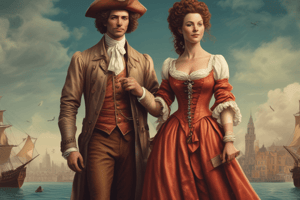Podcast
Questions and Answers
What narrative style is primarily used in Defoe's novels?
What narrative style is primarily used in Defoe's novels?
- Retrospective first-person narration (correct)
- Stream of consciousness narration
- Second-person narration
- Third-person omniscient narration
How long does Robinson Crusoe remain on the desert island?
How long does Robinson Crusoe remain on the desert island?
- 10 years
- 15 years
- 28 years (correct)
- 20 years
What event leads Robinson Crusoe to become shipwrecked?
What event leads Robinson Crusoe to become shipwrecked?
- A navigational error
- A storm during his return voyage
- His voyage to acquire more slaves (correct)
- A pirate attack
What is a unifying theme in Defoe's novels?
What is a unifying theme in Defoe's novels?
What kind of character presentations are used in Defoe's novels?
What kind of character presentations are used in Defoe's novels?
What significant event in Defoe's life involved Queen Anne's disapproval?
What significant event in Defoe's life involved Queen Anne's disapproval?
Which work is widely regarded as Defoe's greatest achievement?
Which work is widely regarded as Defoe's greatest achievement?
What change occurred in Defoe's career around the age of sixty?
What change occurred in Defoe's career around the age of sixty?
In which of his novels does a character repent for a life of crime?
In which of his novels does a character repent for a life of crime?
What was unique about Defoe's approach to storytelling in comparison to earlier writers?
What was unique about Defoe's approach to storytelling in comparison to earlier writers?
Flashcards
Defoe's novel structure
Defoe's novel structure
Defoe's novels often present a series of events and adventures experienced by a single main character, without a strong overarching plot.
Retrospective narration
Retrospective narration
In Defoe's novels, the story is told from the perspective of the main character looking back on their life.
Author's POV coincides with the main character
Author's POV coincides with the main character
In Defoe's novels, the author's view often aligns with the main character's thoughts and experiences.
Character presentation through actions
Character presentation through actions
Signup and view all the flashcards
Robinson Crusoe: The island's purpose
Robinson Crusoe: The island's purpose
Signup and view all the flashcards
Who was Daniel Defoe?
Who was Daniel Defoe?
Signup and view all the flashcards
Why was Defoe imprisoned?
Why was Defoe imprisoned?
Signup and view all the flashcards
What happened to Defoe after his imprisonment?
What happened to Defoe after his imprisonment?
Signup and view all the flashcards
What is 'Robinson Crusoe' about?
What is 'Robinson Crusoe' about?
Signup and view all the flashcards
Why is Defoe considered the 'father of the English novel'?
Why is Defoe considered the 'father of the English novel'?
Signup and view all the flashcards
Study Notes
Daniel Defoe (1660-1731)
- Born into a Dissenter family in 1660
- Studied modern languages, economics, and geography
- Wrote for Whig papers, achieving fame with "The Review"
- Queen Anne disliked his criticism, leading to arrest, trial, and imprisonment
- Made three appearances in the public pillory, which unexpectedly turned into a triumph when a friend threw him flowers
- Became a secret agent for the new government
- Began writing novels around the age of sixty
- Considered the father of the English novel
Defoe's Works
- Robinson Crusoe (1719): The story of a shipwreck on a desert island
- Captain Singleton (1720): The voyage story of a captain who became a pirate
- Colonel Jack (1722): The story of a pickpocket who repents
- Moll Flanders (1722): The adventures of a woman who becomes a thief and prostitute, but eventually lives a respectable life
- Roxana (1724): The adventures of a high-society woman who uses her beauty to achieve her goals
Defoe's Novels: Structure
- Fictional autobiographies, series of episodes and adventures
- Unifying presence of a single hero
- Lack of a coherent plot
- Retrospective first-person narration
- Author's point of view coincides with the main character's
- Characters are presented through their actions
Robinson Crusoe: The Story
- Born in York in 1632, of a German father and English mother
- Anglicised name was Robinson Crusoe
- Left home at age 19 to find his fortune
- Traveled the world
- First voyage took him to Guinea and then England
- Became owner of a plantation in Brazil and set out to get more slaves
- Shipwrecked on a desert island and remained there for 28 years
- Returned to England and found his plantation had made him rich
Robinson Crusoe: The Island
- Ideal place for Robinson to prove his qualities—organizes a primitive empire
- Not a retreat to nature, but opportunity to exploit and dominate nature
Robinson Crusoe: Friday
- Friday is the first native character portrayed in an English novel
- Attractive and lively, becomes a symbol of the colonized
- Robinson rescues Friday, teaches him Western culture and the Bible
Robinson Crusoe: The Middle-Class Hero
- Restless, refused the model from his father to find his identity
- An act of transgression and disobedience
- Isolation on the island after the shipwreck
- Pragmatic, individualistic outlook with rational approach to reality
Robinson Crusoe: The Style
- First-person narration
- Clear and precise details
- Description of primary qualities of objects: solidity, extension, and number
- Simple, matter-of-fact, and concrete language
Robinson Crusoe: The Individual and Society
- Society Robinson creates on the island is not an alternative to England, but an exaltation of 18th-century ideals of mobility, material productiveness, and individualism
- Individual can shape destiny through action, even tho God is prime cause of everything
Robinson Crusoe: A Spiritual Autobiography
- Full of religious references to God, sin, providence, and salvation
- Hero reads the Bible to find comfort
- Defoe explores the conflict between economic motivation and spiritual salvation
Studying That Suits You
Use AI to generate personalized quizzes and flashcards to suit your learning preferences.




